In the world of real estate and financial transactions, the term “escrow” is commonly used. But what exactly does it mean, and how does it work? In this blog, we will delve into the meaning of escrow, explore what an escrow account is, and understand the process of escrow payment.
Escrow Meaning
Let’s start with the basics: what is escrow? Escrow is a financial arrangement where a third party holds and regulates payment of the funds required for two parties involved in a transaction. This third party, known as the escrow agent, acts as a neutral intermediary to ensure that the transaction is carried out smoothly and securely.
If you are looking to do extra funding for your business or start-up, then applying for a personal loan through Airtel Finance should be your way to go:
How to apply for a personal loan through Airtel Finance:
- Step 1: Log in using your mobile number on the Airtel Thanks App.
- Step 2: Fill in your PAN details to get the best offers.
- Step 3: Enter bank account details to receive the loan amount.
The best part about Airtel Personal loans, you ask? The interest rates are super competitive and start from 11.5% and the tenure is flexible.
Also Read: What Is a Home Equity Line of Credit (HELOC)?
What Is An Escrow Account?
An escrow account is a separate account held by the escrow agent on behalf of the parties involved in a transaction. This account is used to hold funds, documents, or other assets until the transaction is completed or certain conditions are met. In real estate transactions, an escrow account is often set up to hold the buyer’s deposit until the sale is finalised.
Escrow Payment
Escrow payment refers to the funds or assets that are held in the escrow account during the transaction process. These funds are typically released to the appropriate party once all the terms and conditions of the transaction have been met. Escrow payment provides security and peace of mind to both the buyer and the seller, ensuring that each party fulfils their obligations before the transaction is finalised.
Also Read: What Is a Charge Off & How To Deal With It?
How Does Escrow Work?
Now that we understand the basic concepts of escrow, let’s take a closer look at how it works in practice. Here’s a step-by-step guide to the escrow process:
Agreement: The buyer and seller agree to the terms of the transaction, including the use of an escrow account.
Opening Escrow: The escrow agent opens an escrow account and receives the funds or assets from the buyer.
Verification: The escrow agent verifies that all conditions of the transaction are met before releasing the funds to the seller.
Completion: Once all conditions are satisfied, the escrow agent disburses the funds to the seller, and the transaction is considered complete.
Also Read: Student Loans based on GPA or grades?
FAQs About Escrow:
1. What are the benefits of using escrow in a transaction?
Escrow provides a secure way for both parties involved in a transaction to ensure that the terms and conditions are met before any funds or assets are released. By using an escrow account, the buyer can be confident that their payment is protected until they receive the agreed-upon goods or services. Likewise, the seller can rest assured that the buyer has the necessary funds available before delivering the product or service. Escrow acts as a neutral third party that facilitates trust and transparency in the transaction process, reducing the risks for both parties.
2. Who typically pays for the escrow services?
The cost of escrow services is usually split between the buyer and the seller, with each party sharing the expenses equally. However, the responsibility for paying the escrow fees can be negotiated and agreed upon as part of the transaction terms. In some cases, one party may agree to cover the entire cost of escrow services as a gesture of goodwill or to secure the deal. Ultimately, the allocation of escrow fees is a negotiable aspect of the transaction and can vary depending on the agreement reached between the parties.
3. Can an escrow account be used for non-real estate transactions?
Yes, an escrow account can be utilised in a wide range of transactions beyond real estate deals. Whether you are engaging in a business agreement, making an online purchase, or settling a legal dispute, an escrow account can provide a secure framework for holding funds or assets until the terms of the transaction are met. This flexibility makes escrow a versatile tool for ensuring the integrity and completion of various types of transactions, offering a layer of protection and confidence to all parties involved.
4. What happens if one party fails to meet the conditions of the transaction?
In the event that one party fails to fulfil the agreed-upon conditions of the transaction, the escrow agent plays a crucial role in resolving the issue. The escrow agent may withhold the funds or assets in the escrow account until the dispute is resolved or follow the established procedures outlined in the escrow agreement. By acting as an impartial mediator, the escrow agent helps to navigate conflicts and ensures that the interests of both parties are protected throughout the transaction process.
5. Is escrow mandatory for all transactions?
Escrow is not mandatory for every transaction, but it is highly recommended, particularly in high-value or complex transactions, to safeguard the interests of all parties involved. While some transactions may proceed without the use of an escrow account, incorporating escrow can offer an additional layer of security and confidence to both the buyer and the seller. By utilising escrow, parties can mitigate risks, prevent disputes, and streamline the transaction process, ultimately fostering a more efficient and trustworthy exchange.
In conclusion, understanding the benefits of escrow, the shared responsibility of escrow fees, the versatility of escrow in various transactions, the role of the escrow agent in resolving disputes, and the optional yet beneficial nature of escrow in transactions can empower individuals to engage in secure and successful exchanges. Escrow serves as a valuable mechanism for promoting trust, transparency, and protection in transactions, enhancing the overall experience for all parties involved.



